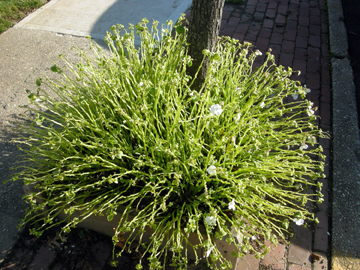Impatiens downy mildew widespread in Kentucky
Impatiens downy mildew widespread in Kentucky

A new disease affecting a popular bedding and container plant will likely change the look of Kentucky gardens for years to come, said Nicole Ward Gauthier, extension plant pathologist for the University of Kentucky College of Agriculture, Food and Environment.
Impatiens downy mildew was first reported in the state in June 2012. It is widespread this growing season. Kentucky is not alone. The majority of states in the eastern half of the United States reported cases of the disease in 2012.
Impatiens downy mildew is caused by the pathogen Plasmopara obducens. The pathogen is a water mold that favors cool, wet or humid conditions. Once established, wind currents, water splash and the movement of infected plants spread it. It is especially devastating to the species Impatiens walleriana, the common garden impatiens.
“Because it is such a devastating disease, many nursery growers elected not to plant impatiens this year,” Gauthier said. “This is why home gardeners may have had trouble finding them this spring.”
Disease symptoms include wilting, yellowing and bloom loss. Homeowners may notice a white growth on undersides of leaves, especially during humid conditions, rainy weather or in irrigated landscapes. Eventually the disease will cause plants to defoliate and die.
If a plant is infected by the pathogen, it cannot be cured. Homeowners who have the disease should remove and destroy all infected plants. Nearby uninfected impatiens can be treated with a fungicide, but different fungicides are approved for commercial growers and home gardeners. Fungicide recommendations for both are available at county extension offices.
“The disease is very hardy and can overwinter in the soil, so impatiens should not be replanted in the same spot next year,” Gauthier said.
While the common impatiens may not be a future option for many gardeners, there are still many plants that make colorful substitutions. Gauthier recommends New Guinea impatiens, Sunpatiens, caladiums, coleus, polka dot plant, Joseph's coat, sweet potato vine and lots of different begonia varieties as possible alternatives.
Extension Horticulture

